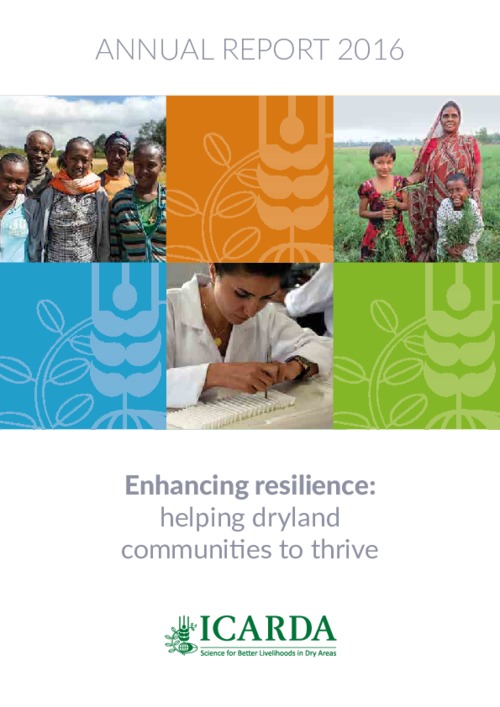Location
The International Center for Agricultural Research in the Dry Areas (ICARDA) was established in 1977. It is one of 15 such centers supported by the CGIAR. ICARDA’s founding mandate to promote agricultural development in the dry areas of developing countries remains highly relevant today.
ICARDA works with a tight focus on the problem-solving needs of resource-poor farmers, achieving this through the in-field delivery of its research outputs. Although global food production has increased by 20 per cent in the past decade, food insecurity and poverty remain widespread, while the natural resource base continues to decline.
International research centers such as ICARDA, which have helped drive previous improvements, continue to deliver new technologies to support sustainable growth in agriculture, and crucially, to work with a wide range of partners to accelerate the dissemination of these technologies.
ICARDA’s biggest strength is its staff – 600 highly skilled men and women from 32 countries. Our research and training activities cover crop improvement, water and land management, integrated crop-livestock-rangeland management, and climate change adaptation.
Other interventions include:
- Water harvesting - supplemental irrigation and water-saving irrigation techniques
- Conservation agriculture methods to reduce production costs and improve sustainability
- Diversification of production systems to high-value crops – horticulture, herbal and medicinal plants
- Integrated crop/rangeland/livestock production systems including non-traditional sources of livestock feed
- Empowerment of rural women – support and training for value-added products.
The ICARDA genebank holds over 135,000 accessions from over 110 countries: traditional varieties, improved germplasm, and a unique set of wild crop relatives. These include wheat, barley, oats and other cereals; food legumes such as faba bean, chickpea, lentil and field pea; forage crops, rangeland plants, and wild relatives of each of these species.
ICARDA’s research portfolio is part of a long-term strategic plan covering 2007 to 2016, focused on improving productivity, incomes and livelihoods among resource-poor households.
The strategy combines continuity with change – addressing current problems while expanding the focus to emerging challenges such as climate change and desertification.
We work closely with national agricultural research systems and government ministries. Over the years the Center has built a network of strong partnerships with national, regional and international institutions, universities, non-governmental organizations and ministries in the developing world and in industrialized countries with advanced research institutes.
THE ‘DRY AREAS’
Research and training activities cover the non-tropical dry areas globally, using West Asia, North Africa, Central Asia and the Caucasus as research platforms to develop, test, and scale-out new innovations and policy options.
Dry areas cover 41 per cent of the world’s land area and are home to one-third of the global population. About 16 per cent of this population lives in chronic poverty, particularly in marginal rainfed areas. The dry areas are challenged by rapid population growth, frequent droughts, high climatic variability, land degradation and desertification, and widespread poverty. The complex of relationships between these challenges has created a "Poverty Trap."
Members:
Resources
Displaying 121 - 125 of 431Overview of the WEB-GIS interface
The GeOC tool is divided in 2 components: the web-based geographic information system (called WEB-GIS tool) and the Sustainable Land Management (called SLM tool).
This video gives a presentation of the key functionalities WEB-GIS interface.
To check the GeOC tool, please follow this link: http://geoc.mel.cgiar.org
To learn more about the project under which the GeOC tool is developed, please follow this link: https://mel.cgiar.org/projects/geoxc
Introduction of the GeOC
Under the Economics of Land degradation initiative (ELD), scientists from ICARDA are collaborating with developments to develop the GeOC tool. It is a new web-based GIS tool to define context specific options for sustainable land management required to achieve Land Degradation Neutrality (LDN).
This video gives further more infromation about the GeOC tool.
To check the GeOC tool, please follow this link: http://geoc.mel.cgiar.org
ICARDA Annual Report 2016
2016 was the hottest year on record – the third consecutive record-breaking year. It was a sign that we have to act fast to enhance the resilience of dryland farmers, who not only have to contend with more extreme temperatures but also face rapidly depleting water resources and the destructive effects of new pests and disease.
First National Workshop for a new/updated Pastoral Code in Tunisia
National discussion and negotiation workshop report with:
Overview of the current situation of the rangelands in the country and related laws within the current forestry regulations (forest code and implementing texts),
Review of ongoing actions, visions and perspectives of national and international partners,
Testimony of selected rangeland users (GDA, Management Councils),
Restoring Degraded Rangelands in Jordan: Optimizing Mechanized Micro Water Harvesting using Rangeland Hydrology and Erosion Model (RHEM)
Jordan’s rangelands, the so called Badia, home of the Bedouins, are threatened through a combination of
over-exploitation of the ecosystem services and a changing climate towards drier seasons and highly
erratic rainfalls. In the recent decades, the once productive grazing lands transformed into sparsely
vegetated and crusted desert grounds not capable of retaining the sporadic rainwater within the landscape
- and consequentialsurface runoff inevitably acceleratessoil erosion and gullying. To counter-measure the






